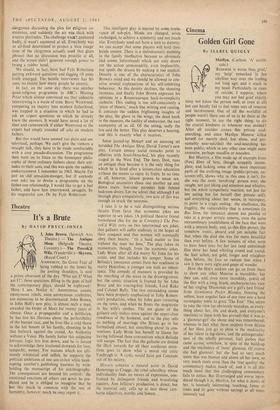Cinema
Golden Girl Gone
By ISABEL QUIGLY Marilyn. (Carlton; 'A' certifi- cate.)
'REMORSE is worse than grief,' my 'help' remarked in her sibylline way over the ironing not long ago, and it stuck in my head. Particularly in cases of suicide, I suppose, where you may not feel grief exactly (may not know the person well, or even at all) but can hardly fail to feel some sort of remorse and involvement. Out of all the worldful of people wasn't there one of us to be there at the right moment, to say the right thing, to do the crucial kindness or whatever was needed? After all suicides comes this private soul- searching, and since Marilyn Monroe killed herself (or merely died, but alone, and pre- sumably near-suicidal) the soul-searching has been public, which in any other case might seem excessive, perhaps maudlin or macabre.
But Marilyn, a film made up of excerpts from (Fox) films of hers, though scrappily incom- plete, and lacking some of the most important parts of the evolving image (public/private, on- screen/off), shows why in this case it isn't; for she was the most 'involving' person ever, she caught. not just liking and attention and whistles, but the whole sympathetic reaction, not just for her acting but for herself (her private self); and everything about her seems, in retrospect, to point to a tragic ending: the ebullience, the fragility, the vulnerability that is sometimes (in Bus Stop, for instance) almost too painful td take at a proper artistic remove, even the quite extraordinary youthfulness of the face that went with a mature body, and, as this film proves, the somehow ironic, absurd and yet suitable fact that when she died she was far more beautiful than ever before. A few minutes of what seem to have been tests for her last (and unfinished) film show her head whirling round and round, the hair ashen, not gold, longer and straighter than before, the face so radiant that when I saw it there were sighs and gasps of wonder.
How the film's makers can go on from there to show any other Monroe is incredible; but they can, and, even more incredibly, polish off the film with a long, brash, uncharacteristic view of her singing 'Diamonds are a girl's best friend' from Gentlemen Prefer Blondes, freezing the softest, least angular face of our time into a hard rectangular smile to greet 'The End.' This seems to take the view (so obviously mistaken, as every- thing about her, life and death, and everyone's reactions to them both has proved) that it was as a `glamour-girl' she shone and was remembered; whereas in fact what these snippets from fifteen of her films just go to show is the mediocrity of her talent in leg-shows, and the unforgettable- ness of the wholly personal, frail pathos that came across, somehow, in spite of the build-up and the mechanics of 'mere' glamour. Of course she had glamour; but she had so very much more that was human and above all her own, so very much more even than the 'star quality' the commentary makes much of; and it is all this much more that this clodhopping commentary fails to notice. But ill-arranged and worse intro- duced though it is, Marilyn, for what it shows of her, is intensely interesting, touching, funny at times and (it goes without saying) at all times intensely sad.






























 Previous page
Previous page